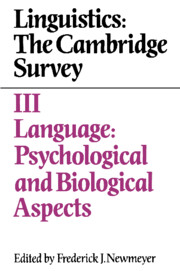Book contents
- Frontmatter
- Contents
- Contributors
- Preface
- 1 Psycholinguistics: an overview
- 2 Language and cognition
- 3 Processes in language production
- 4 Language perception
- 5 The mental lexicon
- 6 Where learning begins: initial representations for language learning
- 7 Second language acquisition
- 8 Neurolinguistics: an overview of language–brain relations in aphasia
- 9 The biological basis for language
- 10 Linguistics and speech–language pathology
- 11 The evolution of human communicative behavior
- 12 Linguistics and animal communication
- Index of names
- Index of subjects
- Contents of Volumes I, II, and IV
2 - Language and cognition
Published online by Cambridge University Press: 03 February 2010
- Frontmatter
- Contents
- Contributors
- Preface
- 1 Psycholinguistics: an overview
- 2 Language and cognition
- 3 Processes in language production
- 4 Language perception
- 5 The mental lexicon
- 6 Where learning begins: initial representations for language learning
- 7 Second language acquisition
- 8 Neurolinguistics: an overview of language–brain relations in aphasia
- 9 The biological basis for language
- 10 Linguistics and speech–language pathology
- 11 The evolution of human communicative behavior
- 12 Linguistics and animal communication
- Index of names
- Index of subjects
- Contents of Volumes I, II, and IV
Summary
Chomskyan linguistics
Before Chomsky, linguistics tended to be a taxonomic enterprise, involving collecting a body of data (utterances) from the external world and classifying it without reference to its source, the human mind; it was a kind of verbal botany, as Searle has put it. Since Chomsky, linguists have thought of themselves as investigating mental representations and rules, and thus as engaged in a branch of theoretical cognitive psychology. Chomsky himself recently characterized the study of generative grammar as having effected a shift of focus in language study from E-language (=externalized language) to I-language (=internalized language), that is, ‘from behaviour or the products of behaviour to states of the mind/brain that enter into behaviour’ (Chomsky 1986: 3). The mentalist picture of language is now a familiar one and I shall do no more here than sketch those of its basic contours which have implications for work on cognitive systems in general:
The interesting questions in studying language concern the nature of our knowledge of language, how we come to have this knowledge, and how we put this knowledge to use.
These questions are to be approached within a general view of the mind as a system of computational principles forming and transforming representations; linguistic knowledge is a set of such principles and putting that knowledge to use involves the interaction of these principles with other systems of mental representation and computation. The characterization of these systems is to be given formally and explicitly in such a way that it involves no appeal to unanalyzed intelligence or intuitions of the subject.
- Type
- Chapter
- Information
- Linguistics: The Cambridge Survey , pp. 38 - 68Publisher: Cambridge University PressPrint publication year: 1988
- 10
- Cited by



